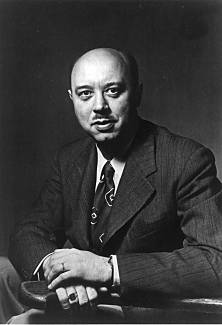« Are the two birds in the bush a better choice than the one in your hand? | Main | Computer-savvy postdoc wanted @ Columbia »
January 23, 2005
Egon Brunswik
DECISION SCIENCE RESEARCHER PROFILE: EGON BRUNSWIK

Egon Brunswik (1903-1955), a pioneer of cognitive psychology, devoted much of his work to the extension and elaboration of the fundamental point that psychology should focus as much on the properties of the organism's environment as it does to the organism itself. The environment that an organism comes into contact with is uncertain and probabilistic. Adaptation to a probabilistic world requires an organism to adopt a probability-based strategy for survival. The organism must learn to rely upon uncertain information about the world. His "probabilistic functionalism" was the first behavior system to be founded on Probabilism, which today increasingly attracts the attention of learning, thinking, decision process, perception, and communication theorists.
In 1921 he graduated from the Theresianische Akademie after receiving training in mathematics, science, classics, and history. He then studied engineering and passed the state examinations but afterward enrolled as a student of psychology at the University of Vienna. Here he became an assistant in Karl Buehler's Psychological Institute (among his student colleagues were Paul F. Lazarsfeld and Konrad Lorenz) and received a PH.D. in 1927. While a graduate student in psychology, he also passed the state examination for Gymnasium teachers in mathematics and physics.
His historical as well as theoretical analysis also led him to criticize orthodox methods of experimental design (particularly the "rule of one variable") and to suggest methods for avoiding what he believed to be an unfortunate artificiality inherent in classical experimental procedures. His main field of empirical research was perception, but he also brought his probabilistic approach to bear on problems of interpersonal perception, thinking, learning, and clinical psychology.
Brunswik's life did not come to a happy end. He committed suicide in 1955.
-from The Brunswik Society homepage
Egon Brunswik redefined the fundamental task of psychology (focus on distal / distal relations) based on thorough study of the history of psychology as a science, came up with a basic theoretical framework (the lens model and probabilistic functionalism) and original methodology of psychological research (representative design of experiments). His papers on perception introducing the concept of ecological validity of perceptual cues) predated the coming of "ecological psychology". Built on his ideas the social judgment theory and cognitive continuum theory of Kenneth R. Hammond University of Colorado) and a others inspired a broad scope of research on perception, cognitive conflict resolution, decision making, policy formation and analysis which blooms on international scale today. Thousands of empirical studies, techniques using computer assisted counseling were developed since the beginning
-from the University of Chicago Press.
QUOTE:
"Perception, then, emerges as that relatively primitive, partly autonomous, institutionalized, ratiomorphic subsystem of cognition which achieves prompt and richly detailed orientation habitually concerning the vitally relevant, mostly distal aspects of the environment on the basis of mutually vicarious, relatively restricted and stereotyped, insufficient evidence in uncertainty-geared interaction and compromise, seemingly following the highest probability for smallness of error at the expense of the highest frequency of precision.That's a simplification. Perception is standing on the sidewalk, watching all the girls go by."
--Frank Rosenblatt, quoting Egon Brunswik's "Perception and the Representative Design of Psychological Experiments," and The New Yorker, December 19, 1959, in "Principles of Neurodynamics: Perceptrons and the Theory of Brain Mechanisms", 1962.
WORKS BY BRUNSWIK:
*1934 Wahrnehmung und Gegenstandswelt: Grundlegung einer Psychologie vom Gegenstand her. Leipzig: Deuticke.
*1937 Psychology as a Science of Objective Relations. Philosophy of Science 4:227-260.
*1943 Organismic Achievement and Environmental Probability. Psychological Review 50:255-272.
*(1947) 1956 Perception and the Representative Design of Psychological Experiments. 2d ed., rev. & enl. Berkeley: Univ. of Calif. Press.
*1952 The Conceptual Framework of Psychology. Univ. of Chicago Press.
*1955 Representative Design and Probabilistic Theory in a Functional Psychology. Psychological Review 62:193-217.
Posted by DSN at January 23, 2005 06:00 PM